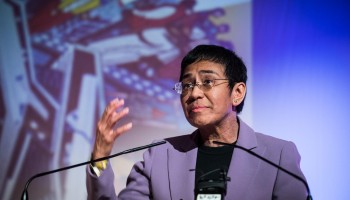Every year, the Organized Crime and Corruption Reporting Project (OCCRP) acknowledges the efforts of those who work tirelessly to promote crime and corruption. For 2013, we give this dubious distinction to the Romanian parliament.
Honorable mentions go to Serbian drug trafficker Darko Šarić and to Gulnara Karimova, the daughter of the president of Uzbekistan.
Crime figures often work diligently to evade the law. This year, the Romanian parliament has won our annual award for its efforts to achieve that very goal—through legal channels.
Early this December, the Romanian parliament approved amendments to the criminal code that would give its members, as well as other elected government officials, immunity from corruption charges.
The amendments, which were voted on without debate, declared that the Romanian president, senators, lawyers, and members of the lower chamber are no longer “public officials.” Therefore, they could no longer be indicted for bribery, abuse of office, conflict of interest, and other corruption-related charges. Government officials already convicted of corruption could be exonerated.
“The Romanian Parliament has taken corruption to a new level in Europe by making it legal. Why now? It’s probably because they know what they have been doing and it’s not good,” said Drew Sullivan, editor of OCCRP.
The proposed changes in the law were “in flagrant contradiction with the international agreements Romania has ratified” according to the Romanian prosecutor’s office, which cited the Council of Europe’s 2002 Criminal Law Convention on Corruption and the 2004 United Nations' Convention on Corruption.
The amendments will not become law unless signed by Romanian President Traian Basescu, who has voiced concerns about them. Nonetheless, damage to rule-of-law and government accountability has already been done.
After the Romanian parliament passed the amendments, media outlets marked the day as the “the Black Tuesday” of Romanian democracy.
The Romanian Parliament has also proposed giving amnesty to those with a jail sentence of less than six years, allegedly to ease overcrowding in prisons—but more likely to free former ministers who are serving time.
At present, 28 members of the Romanian parliament have been convicted or are on trial for corruption. More than 100 Romanian mayors are on trial for abusing their offices.
The OCCRP award in 2012 went to Ilham Aliyev, president of Azerbaijan, whose family has illegally taken a cut of many large businesses in the oil-rich country.
Darko Šarić, representing Serbian and Montenegrin crime groups, was considered for his work in building a massive new drug trade to Europe, transporting drugs from Africa and South America through the Balkans, and turning the region into the new Mexico. Gulnara Karimova, the daughter of Uzbekistan President Islam Karimov, is under investigation for her alleged schemes to take hundreds of millions of dollars in bribes for granting a telecom license to Swedish giant Teliasonera, and then spending the money that should have gone to her impoverished people through proper licensing on a historic chateau in France and other properties
About OCCRP
OCCRP is an award winning consortium of 19 commercial and non-profit investigative centers and hundreds of journalists spanning from Europe to Central Asia. Founded in 2006, its centers work together on cross-border investigative reporting projects spanning the world. OCCRP is probably the world’s largest investigative reporting organization by active reporters and stories produced. OCCRP, a non-profit, has innovative programs in Europe, Eurasia, North Africa and Latin America working in investigative reporting, crime and corruption issues and new technology. It is funded by the Open Society Foundations, the United States Agency for International Development, the National Endowment for Democracy and other donors. It developed the Investigative Dashboard, a leading tool for online investigative reporting, with Google Ideas. This year, OCCRP was a winner or finalist in five international awards including the Global Shining Light Award and the Daniel Pearl Award for investigative reporting. Each year, OCCRP’s more than 140 reporters vote for the person of the year award.
For more information, contact:
Paul Radu, OCCRP Executive Director
Drew Sullivan, OCCRP Editor




